Reading "The Book of Trespass," by Nick Hayes
Threadable-adjacent reading discussion on land ownership
The most recent Threadable reading* for Land Ownership was a selection from Nick Hayes’s 2021 book The Book of Trespass.
I chose two excerpts from this book: from the chapter titled “Fox,” pp. 47 (starting with “I’m sitting in Room 35 of the National Gallery.”) - 58 (end of chapter); and the chapter titled “Sheep,” pp. 111 (starting with “In The Gentle Art of Tramping, the Edwardian journalist and traveller . . .”) - 122 (end of chapter).
*(https://threadablenative.page.link/Rxp8yegeZ1vXy4u19 if you want to try the Threadable app and need the link! Only works on iOS/Apple devices for now.
For anyone new to On the Commons an overview of this project is here. Please feel free to comment or email me with any questions.)
Unfortunately, I could not find any free versions of this book or sections of it online. But it’s a fun book to read, so I recommend the whole thing!
5% of this quarter’s On the Commons paid subscriber earnings will be given to FAST Blackfeet to support food sovereignty and sustainability.
The premise of The Book of Trespass is straightforward: in trespassing on many of England’s large private estates, Hayes is able to trace back the history of each to its original theft, usually from the common people during the enclosure acts. He’s an excellent writer, which allows him to clearly demonstrate the lack of real foundation for private land ownership and the injustice of laws against trespassing and for enclosure.
In an echo of what we previously read in Erik T. Freyfogle’s presentation of law—especially property law—as a story society tells itself about the values it holds, Hayes quotes anthropologist Clifford Geertz writing that:
“Law is not so much a set of norms, rules, principles, values . . . but a part of a distinctive manner of imagining the real. Nowhere is this more true than in the realm of real property laws. Property law has, in effect, helped us to re-imagine and reinvent what we understand to be the real world.”
Part of this reinventing has been a saturation of imagination—about not only what is possible, but what is acceptable. What is right, moral, ethical, or just. Hayes has a great passage describing what happens when property ownership and control (and wealth in general) exerts its power over not just our physical freedoms, but our social relations and interactions. After a run-in with one estate’s gamekeeper, he unpicks the discomfort of the gamekeeper’s social expectation:
“[The] gamekeeper wanted us to ackowledge that what we were doing was shameful: eyes lowered, hats off, a sheepish acceptance of his authority. But like the wall we were sitting on, his authority came from a line drawn not by common consensus but by private considerations masquerading as a moral standard.”
Private considerations masquerading as a moral standard. This phrase encapsulates so much of how a society dominated by land ownership, which then translates into wealth, starts to warp and unbalance the power relationships between people. It’s private considerations masquerading as a moral standard that brings modern North American conservationists, for example, into automatic and absolute acceptance that “private property is bedrock” while repeatedly refusing to question the justice of how that land was transformed, via repeated outright theft, from land into real estate. Into property.
When enclosures first started, there was no acceptance of this supposed bedrock. Instead, there was an understanding that what was happening was theft. The taking of that which belonged to all for the benefit and profit of a very few.
The quote here is from a passage about the Diggers of Warwickshire,
“which argued against: ‘Incroaching tyrants who grins the poor so y they may dwell by themselves in theyr herds of fatt weathers [sheep] . . . onely for theyre own private gain . . . they have depopulated and overthrown whole towns and made thereof sheep pastures . . .’”
Hayes documents some of the devastating effects enclosures had on the common people of England, similar to many covered in Andro Linklater’s Owning the Earth, in both instances taking place repeatedly over centuries.
Six million acres of land enclosed—stolen—in less than 100 years by the dominant class of landowners. And that was after centuries of enclosure had already forced hundreds of thousands off of the land they lived on and in relation with. Every estate, every village, had its own story of enclosure, theft, homelessness, and starvation.
Understanding this theft, how it happened, what its effects has been, and how it manifests in modern land ownership and power relationships, is why I find Hayes’s book so compelling. His trespassing isn’t in North America or even Ireland; it’s in England, where this specific approach to theft of the commons was born, where the relationship between people and the commons was broken by powers that wanted the land for themselves and their pocketbooks, an imposed breaking and theft that was then imported to any lands that colonizers could step on and attempt to claim.
It’s also where these thefts were vigorously and violently resisted.
This is something I’ve written about myself, in an essay on riots for the Center for Humans and Nature, starting with Kett’s Rebellion against enclosure of the commons in 1549.
And it does infuriate me that this history is so little known. Like so much other history buried by the dominant culture and dominant class and dominant mindset, its invisibility to most people allows our imaginations to atrophy. It allows us to accept without questioning that private property is bedrock (of what exactly? Nobody ever really explains that), that land ownership is a norm that we cannot and should not question. It allows us to accept without examining that people like William Blackstone and John Locke were correct when they wrote, with zero evidence and very little reasoning, that private land ownership was somehow just “accepted on all hands” as the only way to run society, that without it humanity will descend into chaos, disorder, and violence.
But these rebellions were extremely active during these men’s times. There is no way they would not have been conscious of them, which makes me wonder if they ignored those realities on purpose, in order to wipe the reality of resistance from the history books. Hayes writes of both Blackstone’s and Locke’s patrons: Locke’s being the Earl of Shaftesbury, leading him, wrote Hayes, to write “essentially in defence of colonialism.”
“And Blackstone himself was writing under the financial patronage of George III and was the Member of Parliament for a rotten borough,* which put him in Parliament by virtue of his landholdings alone.”
*(Getting into rotten boroughs here is too much of a tangent, but I described it a bit in that essay on riots, and if you’re into fiction and like 19th-century British novels, Anthony Trollope’s Palliser series of books is all about Parliament, including rotten boroughs, pocket boroughs, and the fight for the unpropertied for the right to vote.)
There was no objectivity in their writings. There was thought, but as we’ve seen in reading their work on land ownership, it wasn’t of terrible depth, and nowhere were either of them able to point to a true, original justification for private property in land except for slapdash dependence on the Genesis book of the Christian Bible.
But people did fight back, and that history is still there to learn.
I’d intended to write more in this piece about the history of trespass itself, as someone kindly sent me some original legal papers on the subject going back to the 1100s in England. But that ancient history seems to involve trespass suits that included destruction of property or loss of life, which doesn’t have much to do with the simple act of stepping foot on someone else’s land being such an egregious offense as it is today—or if it does, that history wasn’t part of what I read. However, Brian Sawers wrote an excellent paper on the almost complete absence of trespass laws in America before 1865 (an in fact gives many examples of courts deciding for hunters and others, and against landowners, in cases of trespass), and how their introduction was due purely to post-Civil War racism. He published an article about his research with The Atlantic.
Trespass, like all property law, is another story created by a dominant culture and pressed upon society until it was finally accepted as “meant to be.” But it wasn’t. And it doesn’t have to be.
The Book of Trespass is a fierce, wonderfully wrought act of resistance against private land ownership itself. It’s a fun read (and includes Hayes’s own lovely ink drawings), but it’s also a necessary tool. We’ve had a few of those, like Nick Estes’s Our History Is the Future, Andro Linklater’s Owning the Earth, and Erik T. Freyfogle’s The Land We Share. By piecing them together, and at the same time refusing to uncritically accept the bedrock philosophies of a few propertied men with vested interests in the status quo, we can begin, at the very least, to realize that it didn’t have to be this way. We don’t have to accept that the private considerations of the powerful and heavily propertied get to dictate moral considerations for the rest of us.
The final reading will be from Mary Christina Wood’s Nature’s Trust: Environmental Law for a New Ecological Age. Like Freyfogle, Wood is a law professor. Her focus in this book is largely on agency capture and the difficulties that private property rights create for environmental regulation. The section I chose is from the latter part of the book, where she discusses limiting private property rights in the interests of the public good, and the importance of shifting away from thinking about land as a commodity, and to begin to think of it instead as a commonwealth.
A view across the Flathead River’s North Fork. I wish I could share the quiet of this place with you.





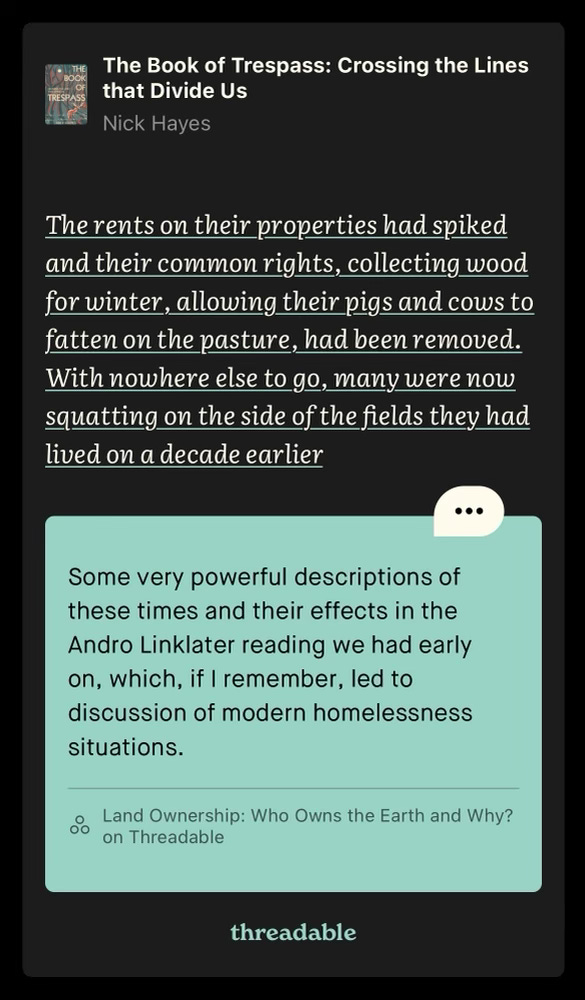
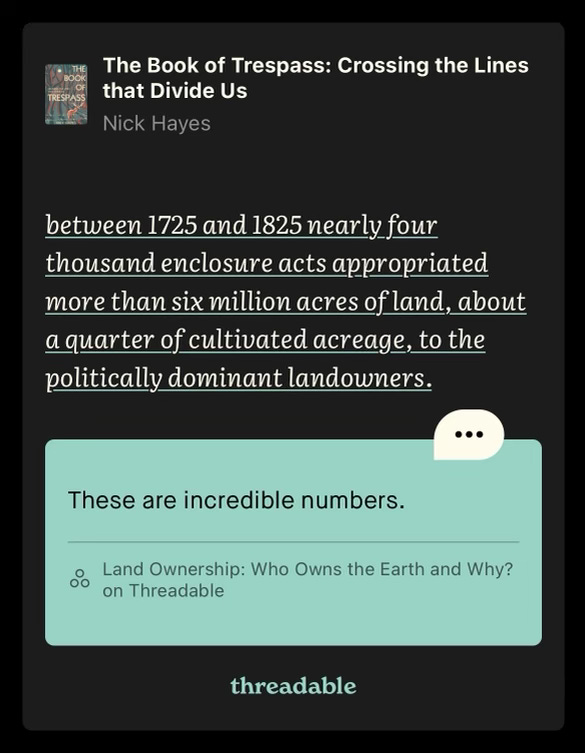

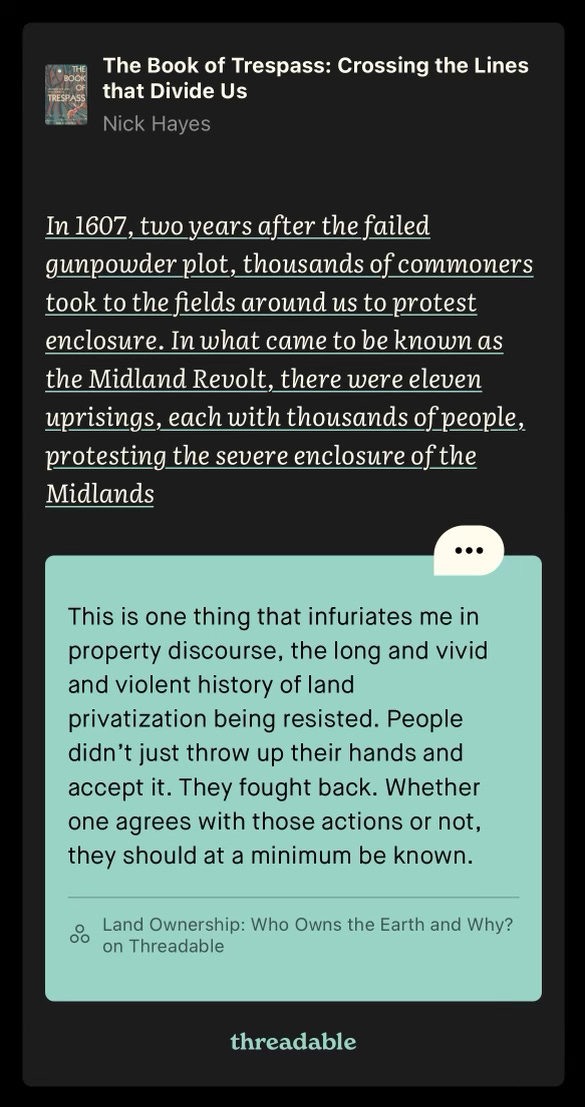
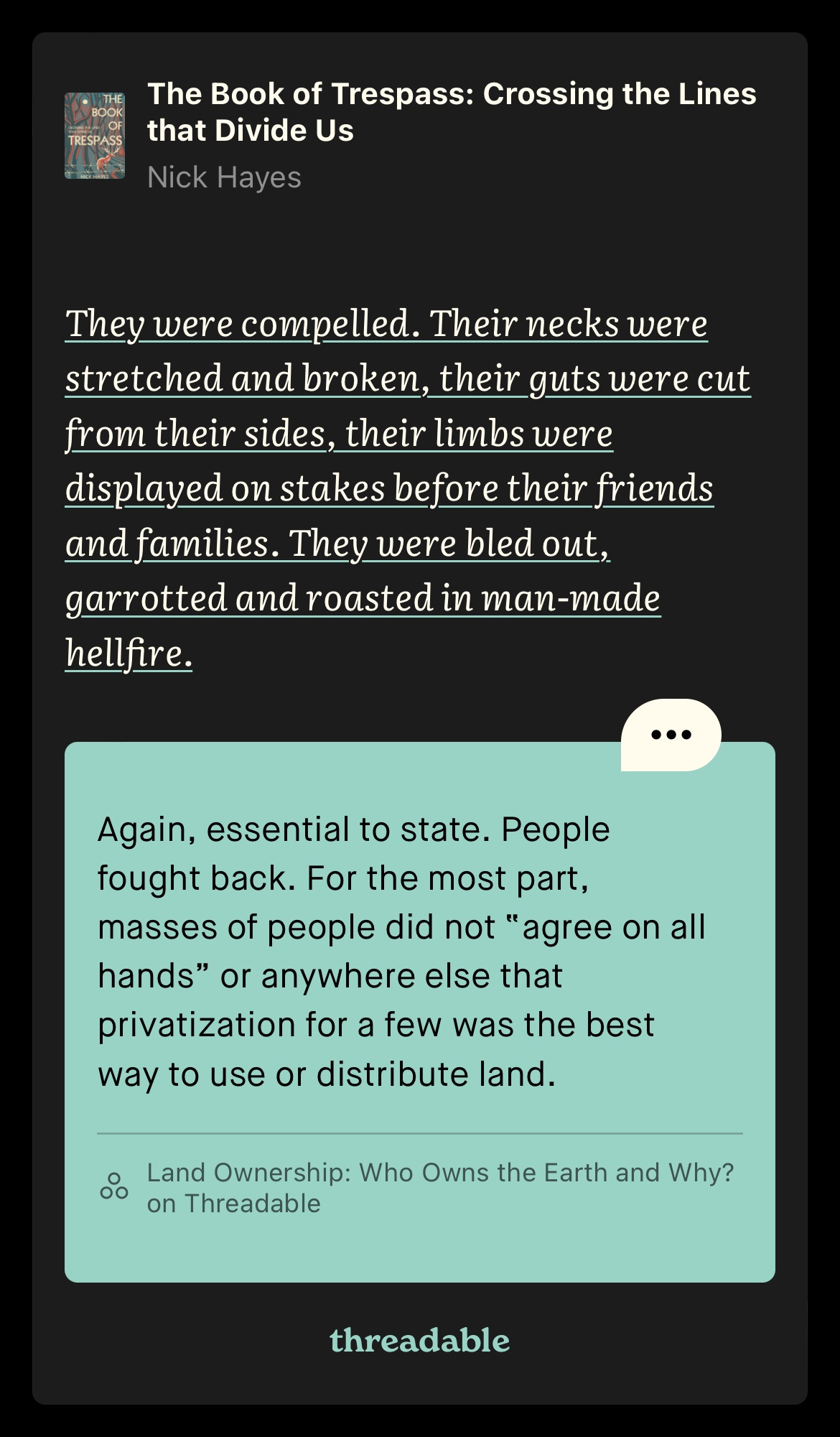
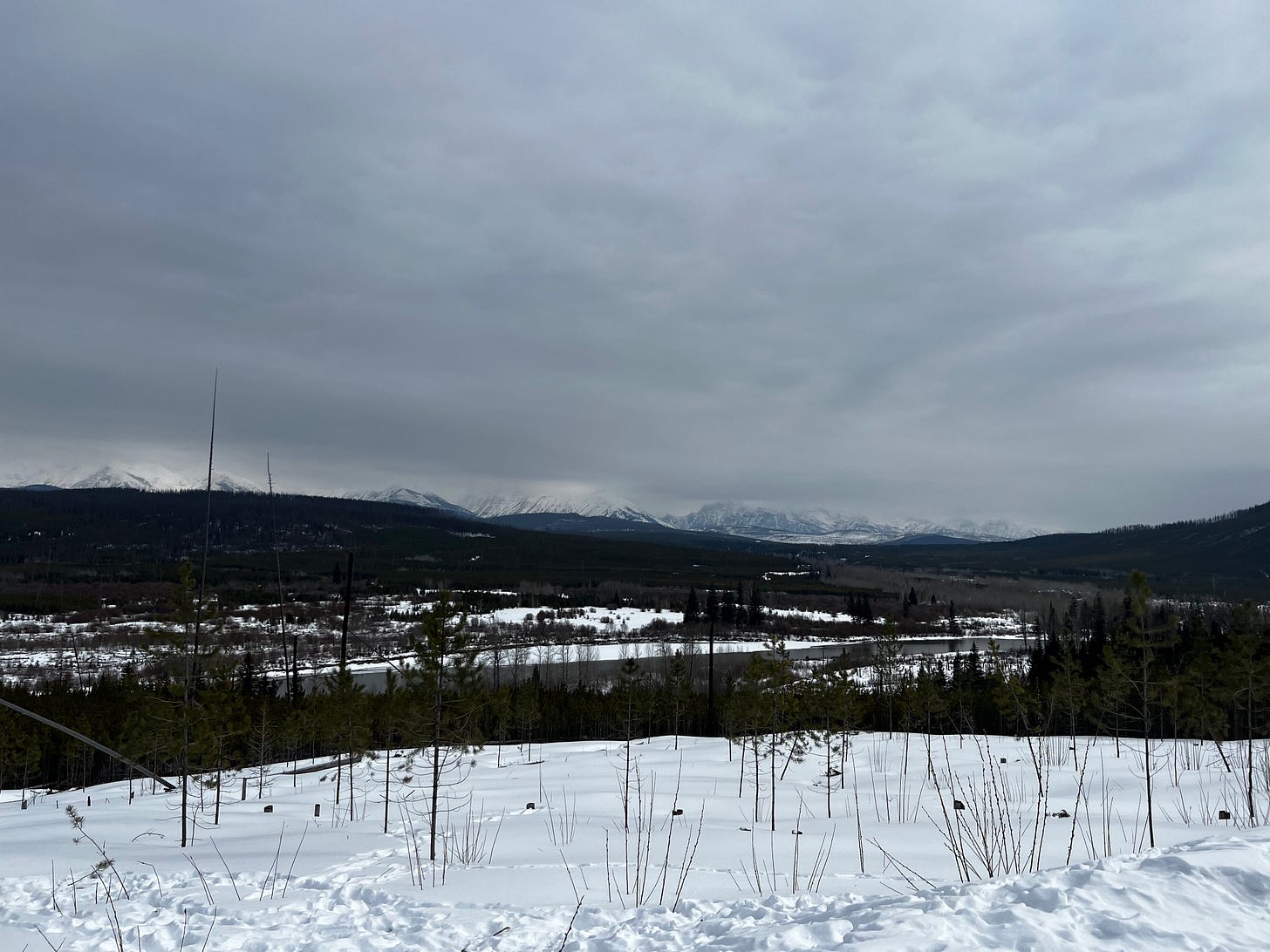
It's ok, all quiet places are connected and I am walking out into one now...
I love that you’re questioning something that has been taken for granted as true. Thank you for tge writing and the research. This was illuminating. I agree with your points. It has been the tool for wealth-building by the powerful, colonization, and theft (though if there was no private property is theft even possible?). Greed is a wrecking ball. Do you think this history is the root of “the American dream”?